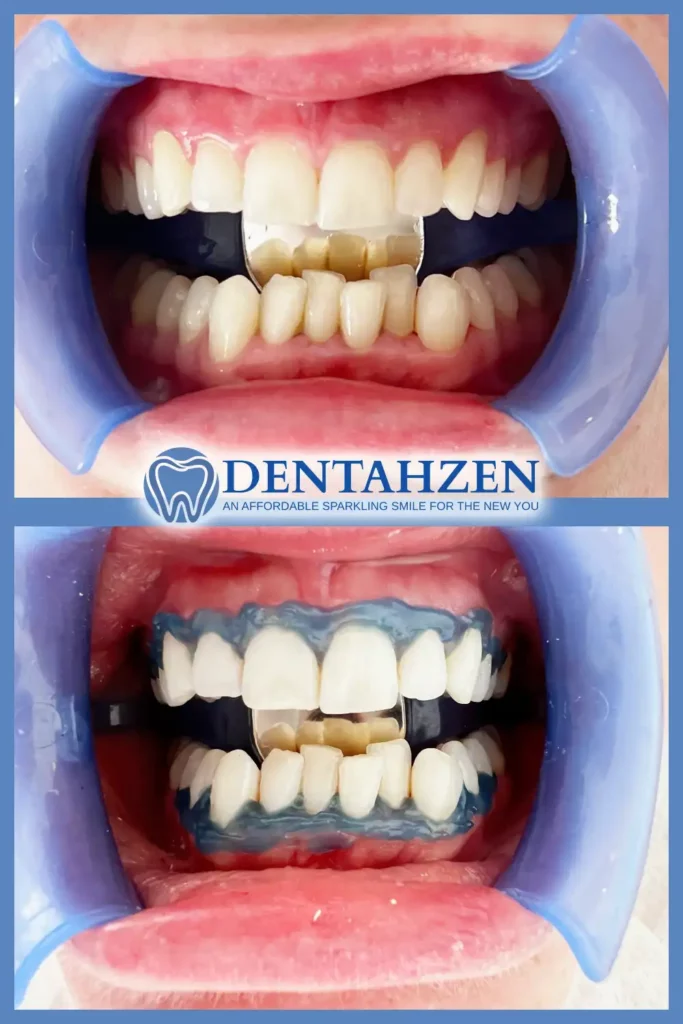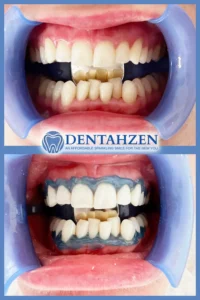A Brighter Smile: Teeth Whitening for Sensitive Teeth in 2023
Teeth Whitening for Sensitive Teeth can be a challenge for those who suffer of sensitive teeth. However, with the right knowledge and techniques, achieving a brighter smile is possible. The first tip offered by experts is to opt for toothpaste specifically designed for sensitive teeth. These toothpastes contain specialized ingredients that help to alleviate tooth sensitivity while also providing effective whitening. Additionally, incorporating gentle whitening treatments into your oral care routine can help to gradually brighten your smile without causing discomfort or sensitivity. It is important to choose products that are specifically formulated for sensitive teeth to ensure that they are safe and effective. Your friendly Kusadasi Dentist Dr. Cafer Can can advice you!
Another expert tip for achieving a brighter smile with sensitive teeth is to practice good oral hygiene habits. Regular brushing and flossing not only help to remove surface stains but also prevent plaque buildup, which can contribute to discoloration. Furthermore, incorporating mouthwashes or rinses into your routine can provide an extra boost of whitening power while also promoting oral health. Lastly, when it comes to diet, limiting the consumption of foods and beverages that can stain teeth, such as coffee, tea, and red wine, can help to preserve the brightness of your smile. By being mindful of your oral care routine and making small adjustments, individuals with sensitive teeth can achieve a brighter smile while still maintaining their dental health.
Key Takeaways
- Teeth whitening for sensitive teeth is possible with the right knowledge and techniques.
- Opt for toothpaste specifically designed for sensitive teeth to alleviate tooth sensitivity while whitening.
- Incorporate gentle whitening treatments into your oral care routine for gradual brightening without discomfort.
- Practice good oral hygiene habits, such as regular brushing and flossing, to remove surface stains and prevent discoloration.
- Limit the consumption of foods and beverages that can stain teeth, like coffee, tea, and red wine.
- Consult with a dentist for professional recommendations on teeth whitening products for sensitive teeth.
- Consider natural remedies like oil pulling and baking soda for gentle alternatives to traditional whitening methods.
- Follow the do’s and don’ts of teeth whitening to ensure a successful and safe experience.
- Take precautions to protect enamel by using whitening products specifically designed for sensitive teeth.
- Maintain long-term results by establishing a proper oral hygiene routine and regular dental check-ups.
Say Goodbye to Discoloration: Effective Whitening Techniques for Sensitive Teeth in 2023
Effective whitening techniques for sensitive teeth have come a long way in providing individuals with a brighter, more confident smile. One of the most effective methods is professional teeth whitening performed by a dentist. This procedure utilizes a highly concentrated whitening gel that is applied to the teeth and activated with a specialized light. The dentist ensures that the gel is only applied to the teeth, avoiding contact with the gums, which can cause sensitivity. With this technique, individuals can achieve noticeable results in just one session, making it an ideal option for those who want quick and reliable results.
Another popular whitening technique for sensitive teeth is using at-home whitening kits prescribed by a dentist. These kits typically include custom-made whitening trays that fit securely over the teeth. The patient then fills the trays with a professional-grade whitening gel and wears them for a specified amount of time each day. Using these custom trays helps to minimize contact between the whitening gel and sensitive gum tissue, reducing the risk of discomfort. Over a period of a few weeks, this method can gradually lighten tooth discoloration, resulting in a more luminous smile without compromising tooth sensitivity.
The Science Behind Tooth Sensitivity: Understanding the Causes and Solutions
Tooth sensitivity is a common dental issue that affects millions of people worldwide. It occurs when the protective layer of enamel on our teeth wears down, leaving the underlying dentin exposed. This can happen due to various reasons, such as aggressive brushing, gum recession, or tooth erosion caused by acids from certain foods and drinks. Additionally, dental conditions like tooth decay, cracked teeth, and worn fillings can also contribute to tooth sensitivity.
When the dentin is exposed, it allows heat, cold, and acidic substances to reach the nerve endings in the teeth, causing pain and discomfort. Understanding the underlying causes of tooth sensitivity is crucial for finding effective solutions. While over-the-counter desensitizing toothpaste can provide temporary relief, it’s essential to address the root cause of sensitivity for long-term benefits. This may involve making changes to your dental hygiene routine, such as using a soft-bristled toothbrush and opting for a toothpaste specifically formulated for sensitive teeth. In some cases, dental treatments like bonding, dental sealants, or inlays/onlays may be necessary to protect the exposed dentin and alleviate sensitivity.
By identifying the causes of tooth sensitivity and adopting the appropriate solutions, individuals can regain control of their dental health and enjoy a pain-free smile. It is recommended to consult with a dental professional for an accurate diagnosis and personalized treatment plan tailored to your specific needs. Remember, understanding the science behind tooth sensitivity is the first step towards a brighter and healthier smile.
Professional Recommendations: Dentist-Approved Teeth Whitening Products for Sensitive Teeth in 2023
When it comes to finding the right teeth whitening products for sensitive teeth, it is essential to consult with a dentist for professional recommendations. Dentists have the expertise and knowledge to identify the most suitable options that will effectively whiten your teeth without causing further sensitivity. In 2023, there are several dentist-approved teeth whitening products available that cater specifically to individuals with sensitive teeth.
One such product is the gentle whitening gel, recommended by dentists for its effectiveness in brightening smiles while minimizing tooth sensitivity. This gel contains a lower concentration of bleaching agents, making it ideal for individuals with sensitive teeth. Dentists also recommend toothpaste formulated with potassium nitrate, an ingredient that helps alleviate tooth sensitivity while whitening the teeth. These dentist-approved products promise noticeable results without compromising the health of your teeth and gums.
Natural Remedies to Brighten Your Smile: Gentle Alternatives for Sensitive Teeth in 2023
Sensitive teeth can often make traditional teeth whitening methods uncomfortable or even painful. However, there are gentle alternatives that can help brighten your smile without causing additional sensitivity. One natural remedy is oil pulling, which involves swishing oil, such as coconut oil, in your mouth for a few minutes each day. This practice is believed to remove bacteria and plaque, resulting in a cleaner and brighter smile. Another gentle alternative is using baking soda. Mixing baking soda with water to create a paste and brushing your teeth with it can help remove surface stains without causing sensitivity. However, it’s important to note that these natural remedies may not provide the same dramatic whitening results as professional treatments.
In addition to oil pulling and baking soda, there are other natural remedies for teeth whitening that may help brighten your smile. One option is using hydrogen peroxide as a mouth rinse. Diluting hydrogen peroxide with water and swishing it in your mouth for a short time can help remove stains and whiten teeth. Another gentle alternative is using activated charcoal. Applying activated charcoal powder to your toothbrush and brushing gently can help remove surface stains. However, it’s important to use caution with activated charcoal as it can be abrasive and may damage enamel if used too frequently.
The Do’s and Don’ts of Teeth Whitening: Essential Guidelines for Sensitive Teeth
Sensitive teeth require special care when it comes to teeth whitening. To ensure a successful and safe whitening experience, there are certain do’s and don’ts that individuals with sensitive teeth should keep in mind. First and foremost, it is essential to consult with a dental professional before starting any whitening treatment. They can assess the condition of your teeth and recommend the most suitable whitening options for your specific needs.
When it comes to the do’s of teeth whitening for sensitive teeth, using a gentle, low-concentration whitening gel is highly recommended. This helps minimize sensitivity while still achieving noticeable results. It is also important to follow the instructions provided by the manufacturer and not exceed the recommended usage time. Whitening strips or trays that are specifically designed for sensitive teeth can be a good option as they provide a more controlled application and minimize contact with the gums, which can lead to irritation. Additionally, maintaining good oral hygiene practices, such as brushing and flossing regularly, can help prolong the results of teeth whitening.


Protecting Your Enamel: Precautions and Preparations for Whitening Sensitive Teeth
When it comes to teeth whitening for sensitive teeth, it is crucial to take precautions to protect your enamel. Enamel is the outermost layer of your teeth, and it serves as a protective shield against plaque and acid attacks. Before beginning any whitening treatment, it is essential to consult with a dental professional who can assess the sensitivity level of your teeth and recommend the best course of action.
One important precaution is to choose a whitening product specifically designed for sensitive teeth. These products are formulated to minimize sensitivity while effectively brightening your smile. Look for products that contain ingredients like potassium nitrate or fluoride, as these can help strengthen your enamel and reduce sensitivity. Additionally, be sure to follow the instructions provided with the whitening product and avoid using it more frequently or for longer periods than recommended by your dentist. By taking the right precautions and using the appropriate products, you can maintain the health of your enamel while achieving a whiter smile.
Personalized Solutions: Customized Teeth Whitening Options for Sensitive Teeth in 2023
When it comes to teeth whitening for sensitive teeth, personalized solutions and customized options are essential for achieving optimal results. In 2023, dental professionals are focusing on tailoring teeth whitening treatments to meet the unique needs and sensitivities of each patient.
One personalized solution that has gained popularity is the use of custom-made whitening trays. These trays are made from impressions of the patient’s teeth and are designed to fit perfectly, ensuring that the whitening gel is evenly distributed and in contact with the teeth’s surfaces. Customized trays allow for a more controlled and targeted approach, minimizing the risk of sensitivity and discomfort during the whitening process. Additionally, the trays can be used at home, making it convenient for individuals to whiten their teeth at their own pace.
Another customized option for sensitive teeth is the use of desensitizing agents in conjunction with the whitening treatment. These agents help to reduce sensitivity and provide comfort during the whitening process. Dental professionals may apply desensitizing gels or varnishes to the teeth before or after the whitening treatment, further ensuring a personalized approach based on the individual’s needs. By incorporating desensitizing agents, patients can still achieve a brighter smile without the worry of experiencing excessive sensitivity.
In 2023, personalized solutions and customized teeth whitening for sensitive teeth options are revolutionizing the way individuals with sensitive teeth can improve the brightness of their smiles. Through the use of custom-made trays and desensitizing agents, dental professionals are able to tailor treatments to minimize discomfort and maximize results. These advancements provide a promising outlook for those seeking effective teeth whitening options without compromising their oral health.


Long-Term Results: Maintaining a Radiant Smile After Teeth Whitening
After undergoing teeth whitening treatment, it is important to maintain the results and keep your smile radiant for the long term. To achieve this, it is essential to establish a proper oral hygiene routine. Brushing your teeth twice a day with a soft-bristled toothbrush and using a toothpaste specifically designed for sensitive teeth can help prevent discoloration and maintain the brightness of your smile. Additionally, incorporating flossing into your daily routine will remove plaque and prevent stains from settling between your teeth.
Regular dental check-ups are crucial in ensuring the long-term success of your teeth whitening treatment. Your dentist will not only assess the condition of your teeth and gums but also provide professional cleaning to remove any surface stains. This will help maintain the whiteness of your teeth and ensure that any potential issues are addressed promptly. Following your dentist’s advice on at-home care and recommended dental procedures can greatly contribute to the prolonged radiance of your smile.
Smiling with Confidence: Success Stories of Individuals with Sensitive Teeth
Within the realm of dental care, individuals with sensitive teeth have often faced challenges in achieving a confident smile. However, in 2023, advancements in teeth whitening for sensitive teeth technology have given rise to success stories from countless individuals who have successfully overcome this hurdle. These success stories are testaments to the transformative power of modern dental solutions for sensitive teeth, allowing individuals to smile with confidence like never before.
With personalized, dentist-approved teeth whitening products and customized treatment options, individuals with sensitive teeth can now achieve long-lasting results without compromising their dental health. These success stories highlight how individuals have not only achieved a brighter smile but have also found relief from tooth sensitivity. Through gentle alternatives, natural remedies, and proper precautions, these individuals have discovered a newfound confidence in their smiles, paving the way for a future where tooth sensitivity is no longer a roadblock to achieving the radiant smile one desires.
Frequently Asked Questions
How can I achieve a brighter smile if I have sensitive teeth?
There are several options for individuals with sensitive teeth to achieve a brighter smile. It is recommended to consult with a dentist who can provide personalized recommendations and suggest dentist-approved teeth whitening products specifically designed for sensitive teeth. Additionally, natural remedies and gentle alternatives can be explored as well.
What are some effective whitening techniques for sensitive teeth in 2023?
In 2023, there are various effective whitening techniques available for individuals with sensitive teeth. These may include professional recommendations such as dentist-approved teeth whitening products, customized teeth whitening options, and natural remedies that are gentle on sensitive teeth. It is crucial to follow professional guidelines and precautions to ensure optimal results.
What causes tooth sensitivity and what are the solutions?
Tooth sensitivity can be caused by a variety of factors such as exposed dentin, enamel erosion, gum recession, or tooth decay. Solutions for tooth sensitivity include using desensitizing toothpaste, avoiding acidic foods and beverages, practicing good oral hygiene, and seeking dental treatments that address the underlying causes of sensitivity.
Are there any precautions I should take before whitening my sensitive teeth?
Yes, there are precautions you should take when it comes to teeth whitening for sensitive teeth. It is important to consult with a dentist to determine the best course of action for your specific situation. They may recommend using desensitizing toothpaste prior to whitening, avoiding certain foods and drinks, and ensuring that your teeth and gums are in a healthy condition before undergoing any whitening treatments.
How can I maintain a radiant smile after teeth whitening, especially if I have sensitive teeth?
Maintaining a radiant smile after teeth whitening, even with sensitive teeth, requires a combination of good oral hygiene practices and regular dental care. This may include brushing with a soft-bristled toothbrush, using desensitizing toothpaste, avoiding stain-causing foods and beverages, and scheduling regular dental check-ups for professional cleanings and assessments. Following these habits consistently can help prolong the results of teeth whitening treatments.


